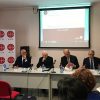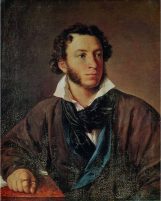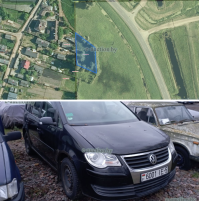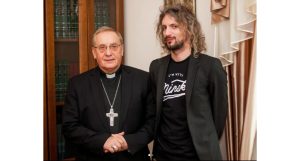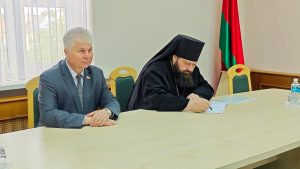Forum 18. BELARUS: Threatened with criminal prosecution for sharing faith in public
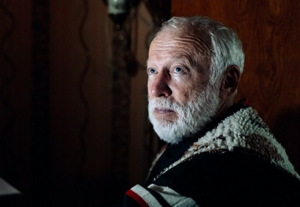

Organisation"Forum 18"
Норвежская организация, целью которой является содействие религиозной свободе.
25 August 2023
Felix Corley, Forum 18, and Olga Glace, Forum 18
Prosecutor Fyodor Mikhovich refused to explain why he threatened Baptist Vladimir Burshtyn with criminal prosecution if he continues to share his faith in public. “I do not know who you are,” he told Forum 18. The threat came after a court fined Burshtyn a month’s average pension for sharing his faith. Border guards detained Greek Catholic Boris Khamaida as he travelled to a pilgrimage. A jail term prevented him from attending. A draft new Religion Law is set to reach Parliament in September.
On 27 July, Malorita District Prosecutor Fyodor Mikhovich in the south-western Brest Region summoned Council of Churches Baptist Vladimir Burshtyn. The Prosecutor threatened him with criminal prosecution for “Incitement of racial, ethnic, religious or other social hatred or discord” if he continues to share his faith in public.
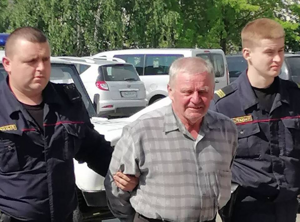
© Baptist Council of Churches
The threat came eight weeks after a court fined Burshtyn – who is in his seventies – the equivalent of just over a month’s average pension for singing, sharing his faith and offering Christian literature to passers-by with fellow Baptists in Drogichin (see below).
Burshtyn had earlier been fined in 2005 and 2008 to punish him for exercising freedom of religion or belief (see below).
Asked why he threatened Burshtyn with possible criminal prosecution, Prosecutor Mikhovich refused to give any response. “We never refused to receive him here and we explicitly explained everything to him,” he told Forum 18. “I do not know who you are, and will not give you any additional information” (see below).
Deputy Plenipotentiary for Religious and Ethnic Affairs Sergei Gerasimenya – who was appointed in the summer – had put the phone down before Forum 18 could ask why Burshtyn had been threatened with criminal prosecution if he exercises his freedom of religion or belief in future by sharing his faith in public (see below).
On 28 July, border guards in Bigosovo detained Boris Khamaida, a human rights defender from Vitebsk and a Greek Catholic, as he was on his way to join a walking pilgrimage to Holy Trinity Catholic Church at Rositsa, a pilgrimage he takes part in every year. The pilgrimage commemorates two Catholic priests among those executed during the Nazi occupation in 1943. A court jailed Khamaida for 15 days for having a banned symbol on the wallet of his identity card, preventing him from joining the pilgrimage (see below).
Asked why his border guards had detained Khamaida as he was on his way to a pilgrimage, Bigosovo Border Guards Unit head, who did not give his name, told Forum 18 it was a wrong number and put the phone down (see below).
The restrictive draft new Religion Law is set to reach the lower chamber of the non-freely elected parliament, the House of Representatives, in September. If adopted in current form, it would continue and even increase many of the restrictions on exercising freedom of religion or belief. It would also require all registered religious communities to gain re-registration within a year if they wish to continue to function (see below).
“The draft new Law has not yet reached the House of Representatives,” an official of its Human Rights, Ethnic Relations and the Media Commission told Forum 18. Asked whether her Commission will lead consideration of the draft, she responded: “That will be determined by the [House of Representatives] leadership only when the draft Law has arrived” (see below).
The Office of the Plenipotentiary for Religious and Ethnic Affairs dismissed all 18 comments and suggestions on the proposed draft Religion Law posted on the government’s legal website during the June consultation period. It made no mention if submission sent to it directly. Deputy Plenipotentiary Gerasimenya refused to tell Forum 18 whether the Plenipotentiary’s Office disregarded all submissions on the proposed new Law or only those sent through the website (see below).
Belarus has not sought a legal review of the draft Law from the OSCE’s Office for Democratic Institutions and Human Rights (ODIHR), ODIHR’s spokesperson told Forum 18 (see below).
Meanwhile, Vyacheslav Goncharenko, Pastor of Minsk’s New Life Pentecostal Church, was freed on 24 August after serving in full his 10-day jail term following his 14 August arrest. He was freed the day after a closed hearing at Minsk’s Central District Court considered a Prosecutor’s suit to declare two internet posts “extremist material” containing “deliberately false information on political and social situation in the Republic of Belarus”. The Church’s youth pastor Ilya Budai was freed on 19 August after serving a five-day jail term. The regime seized and bulldozed New Life Church and has already blocked the Church’s website (see forthcoming F18News article).
On 16 August, Miory District Court declared the Telegram channel of the Christian Vision group to be “extremist”. The group documents violations of freedom of religion or belief and other human rights (see forthcoming F18News article).
Baptist threatened with criminal prosecution if he shares his faith again in public
On 27 July, Malorita District Prosecutor Fyodor Mikhovich summoned Council of Churches Baptist Vladimir Burshtyn – who is in his seventies – and threatened him with prosecution under Criminal Code Article 130 if he continues to share his faith in public, Baptists told Forum 18.
Criminal Code Article 130 punishes “Incitement of racial, ethnic, religious or other social hatred or discord”, with a maximum punishment of five years’ imprisonment (10 years’ imprisonment if violence is involved and 12 years’ imprisonment if a group is involved or the action leads to a death).
Burshtyn is a member of the Council of Churches Baptists, who do not seek state permission to exercise freedom of religion or belief.
Asked why he threatened Burshtyn with possible criminal prosecution, Prosecutor Mikhovich refused to give any response. “We never refused to receive him here and we explicitly explained everything to him,” he told Forum 18 from Malorita on 23 August. “I do not know who you are, and will not give you any additional information.”
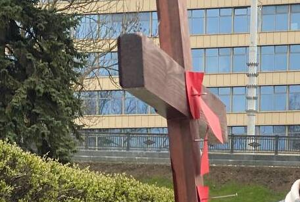
© Private
Deputy Plenipotentiary for Religious and Ethnic Affairs Sergei Gerasimenya – who was appointed in the summer – had put the phone down on 23 August before Forum 18 could ask why Burshtyn had been threatened with criminal prosecution if he exercises his freedom of religion or belief in future by sharing his faith in public.
The authorities consider sharing faith or talking about religion to passers-by as mass events which are illegal unless individuals have gained prior state approval.
On 15 April, the day before Orthodox Christian Easter, police arrested seven young Protestants from several churches who were talking about their faith with passers-by in central Minsk and took them handcuffed to the police station. A court fined each about two months’ average wages.
In 2022, courts used Administrative Code Article 24.23, Part 1 (“Violation of the procedure for organising or conducting a mass event or demonstration”) to punish three Protestant pastors in Gomel for holding outdoor baptisms, and two Protestant pastors in Minsk for leading worship in the car park of the confiscated New Life Pentecostal Church.
Baptist’s earlier punishments for sharing faith
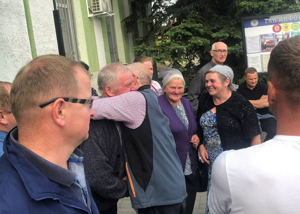
© Baptist Council of Churches
Vladimir Burshtyn, who lives in Malorita in the south-western Brest Region, has been repeatedly fined for exercising freedom of religion or belief.
In 2005, an administrative commission fined Burshtyn for leading his unregistered congregation in Malorita.
In 2008, a court fined Burshtyn the equivalent of more than two months’ average wages for sharing his faith outside a market in the town of Ushachi in Vitebsk Region. At the time, his fine was the highest handed down to a member of the Baptist Council of Churches.
In late May 2023, Burshtyn was among a group of Council of Churches Baptists who travelled to Drogichin, 110 kms (70 miles) from Malorita. There they shared their faith in the main square, accompanied by a musical band. They also offered Christian literature to passers-by.
Two police cars soon arrived. Officers took Burshtyn in one car to the police station. They took other Baptists in the other. Officers questioned all of them before letting them go.
Drogichin Police telephoned Burshtyn on 31 May, ordering him to come in the following day. Officers said he would be issued with a record of an offence. However, on 1 June officers put him in handcuffs in a corridor and took him to the temporary detention centre.
“When his wife and children called, [the police officers] replied that he was being fed and that he had gone to rest,” local Baptists noted. “But this wasn’t true.”
On the morning of 2 June, after a night in a cell, Burshtyn was put in handcuffs again and taken to the court. At the court building he saw his wife and children and other church members gathered in his support and singing. Two officers brought him into the court building, ordering church members out of the corridor.
However, after about an hour and a half, officers took Burshtyn back to the detention centre, telling those who had gathered in his support that the hearing had been rescheduled for 5 pm that day. Officials would not say where the hearing would be held.
Officials took Burshtyn to the police station at about 5 pm, where a “very speedy hearing” took place under Judge Leonty Stankevich. Burshtyn rejected the charges, insisting that “preaching the Gospel is not a violation of public order”. The Judge fined him 15 base units, 555 Belarusian Roubles under Administrative Code Article 24.23 (“Violation of the procedure for organising or conducting a mass event or demonstration”), Part 1. This is equivalent to just over a month’s average pension or about two weeks’ average wage.
The court sent Burshtyn the written decision by post. As he was away from home he missed the deadline for filing an appeal, Baptists noted. He then appealed to the Prosecutor’s Office to be able to challenge the court decision. He pointed out that the decision wrongly states that the public sharing of faith was on 27 September (instead of the correct date of 27 May).
Blocked from going on pilgrimage

© Svaboda.org (RFE/RL)
On the morning of 28 July, border guards detained Boris Khamaida, a human rights defender from Vitebsk and a Greek Catholic, at Bigosovo station 6 kms (4 miles) from the northern border with Latvia. The 75-year-old Khamaida was thus prevented from joining the annual pilgrimage on foot to Holy Trinity Catholic Church at Rositsa, a pilgrimage he takes part in every year.
Holy Trinity Church contains a shrine to two local Catholic priests, Fr Antoni Leszczewicz and Fr Jerzy Kaszyra, who were among those killed in a punitive operation in February 1943 during the Nazi occupation. The Catholic Church has beatified the two as martyrs. This year, the pilgrimage marked the 80th anniversary of the priests’ deaths.
The Church website announcing the 28 and 29 July commemoration includes a note: “Warning! As Rositsa is located in a border zone, it is necessary to have your identity document with you.”
When in the train the border guards asked Khamaida to show his identity document, they saw that Khamaida kept it in a wallet decorated with the Pahonia, the mounted rider which had been the emblem of Belarus between 1991 and 1995, which Lukashenko regards as an opposition symbol.
At Bigosovo station, border guards ordered Khamaida off the train and detained him on the platform, Nasha Niva news website noted on 29 July. They took him to Verkhnedvinsk. On 31 July, Verkhnedvinsk District Court jailed him for 15 days on unknown charges, Viasna (Spring) human rights group noted on 3 August. He was freed on the afternoon of 12 August. The Court refused to give Forum 18 any information about the case on 25 August.
(Five Viasna members are currently serving prison terms to punish them for their defence of human rights. On 23 August, the Interior Ministry labelled Viasna an “extremist formation” and banned its activities including its website and many of its other social media, adding the group to the “List of organisations, formations and individual entrepreneurs linked to extremist activities”.)
On 25 August, the duty officer at Bigosovo Border Guards Unit put Forum 18 through to its head. Asked why his border guards had detained Khamaida as he was on his way to a pilgrimage, the Unit head, who did not give his name, told Forum 18 it was a wrong number and put the phone down.
Deputy Plenipotentiary for Religious and Ethnic Affairs Sergei Gerasimenya had put the phone down on 23 August before Forum 18 could ask why Khamaida was prevented from joining the pilgrimage to Rositsa.
Proposed new Religion Law to reach Parliament in September
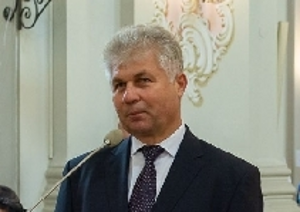
© Viktar Vedzen/Catholic.by
On 2 June, the regime made public on its legal website the draft of the proposed new Religion Law, prepared by the Plenipotentiary for Religious and Ethnic Affairs Aleksandr Rumak. The website said the draft Law was open for public comments from 5 to 15 June.
The proposed new Religion Law harshens the restrictive 2002 Religion Law, which human rights defenders at the time publicly condemned.
The proposed new Law would among other things:
– continue to require all religious communities to gain state registration before they are allowed to operate;
– ban “the activity of unregistered religious organisations”;
– impose compulsory re-registration within one year on all registered religious communities, paralleling earlier demands on political parties and other public associations;
– impose even tighter registration restrictions and conditions;
– make extensive and arbitrary use of the undefined terms “extremism”, “terrorism”, and “the ideology of the Belarusian state” to justify restricting the exercise of freedom of religion or belief and related fundamental freedoms;
– give the regime new powers for regime to inspect and monitor religious communities;
– give greater “legal” possibilities for the regime to forcibly close religious communities;
– continue and increase censorship and restrictions on religious literature and items, including banning educational establishments from including religious literature in their libraries;
– impose new restrictions on religious education by religious communities, as well as increasing regime surveillance of this;
– aim to separate religious communities from involvement with wider society;
– and impose new restrictions on religious charitable activity.
The draft text of the proposed new Law would require all registered religious communities to bring their statutes into line with the provisions of the new Law and apply for re-registration within one year. It appears that if religious communities fail to get the compulsory re-registration, all their activity would become illegal.
The proposed draft new Religion Law is due to reach the lower chamber of the non-freely elected Parliament, the House of Representatives, in September, according to the annual plan of new legislation. The autumn session of the House of Representatives is due to start on 19 September, according to its website.
“The draft new Law has not yet reached the House of Representatives,” an official of its Human Rights, Ethnic Relations and the Media Commission told Forum 18 from Minsk on 24 August. Asked whether her Commission will lead consideration of the draft, she responded: “That will be determined by the [House of Representatives] leadership only when the draft Law has arrived.”
Belarus has not sought a legal review of the draft Law from the OSCE’s Office for Democratic Institutions and Human Rights (ODIHR). “ODIHR hasn’t so far received a request from the Belarusian authorities to review the draft law, but we would be ready and willing to do so if asked,” ODIHR spokesperson Katya Andrusz reiterated on 24 August, following an initial comment to Forum 18 in June.
Officials disregard comments on proposed new Religion Law
The Plenipotentiary’s Office noted on 18 July that 18 comments and suggestions on the proposed draft Religion Law had been posted on the government’s legal website during the June consultation period. However, it dismissed all these comments.
“According to the organiser of the consultation,” the government’s legal website quoted the Plenipotentiary’s Office as declaring, “the proposals received were not taken into account, since they do not establish new and fundamentally changing existing approaches to the legal regulation of a certain area of public relations.”
Some religious communities published their comments on the draft Law or sent them directly to the Plenipotentiary’s Office.
Deputy Plenipotentiary Sergei Gerasimenya refused to tell Forum 18 on 23 August whether the Plenipotentiary’s Office disregarded all submissions on the proposed new Law or only those sent through the website. He refused to answer any other questions.


